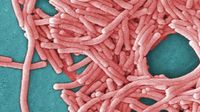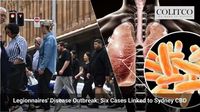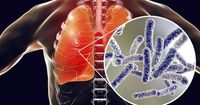A major health alert has been issued for anyone who has visited Sydney's central business district (CBD) in the last ten days following several confirmed cases of Legionnaires' disease. Six individuals, who have no known connection to each other, have been hospitalized after contracting this potentially life-threatening form of pneumonia, prompting NSW Health to urge vigilance among the public.
Legionnaires' disease is caused by the Legionella bacteria, which is typically found in water sources. Infection occurs when contaminated water droplets, often from inadequately maintained cooling towers, become airborne and are inhaled. It is important to note that the disease is not contagious between individuals.
The symptoms of Legionnaires' disease can appear up to ten days after exposure and include fever, chills, cough, and shortness of breath. Those most at risk include elderly individuals, smokers, and people with underlying lung conditions. Vicky Sheppeard, Director of the South-Eastern Sydney Local Health District Public Health Unit, confirmed that all six patients spent time in the Sydney CBD during the likely exposure period, which spanned from March 21 to April 10, 2025.
"We are investigating the source of these cases," Sheppeard stated. "It’s possible that not all the cases are linked." This uncertainty has led health authorities to take swift action, reviewing maintenance records for cooling towers in the area and collaborating with the City of Sydney to identify and inspect potentially contaminated systems.
The outbreak has raised alarms, especially since it follows a similar incident in Melbourne last August, where over 100 people contracted Legionnaires' disease, leading to two fatalities. Another outbreak in Sydney in January 2024 resulted in seven hospitalizations, with three additional cases diagnosed near the University of Sydney.
NSW Health has advised anyone who visited the Sydney CBD in the past ten days to be alert for symptoms. The health agency emphasizes that early detection and treatment are crucial in preventing severe complications. "We urge anyone who has been in the CBD over the past week and a half to monitor for symptoms," Sheppeard added. "People who develop symptoms should visit their GP and get tested." The disease has a fatality rate of around 10%, making prompt medical attention vital.
Building owners in the Sydney CBD have also been reminded of their obligations to ensure that cooling towers are properly maintained. Sheppeard noted, "Building owners should ensure their cooling towers are operated and maintained in compliance with regulations." This reminder comes amid ongoing inspections and maintenance reviews by health authorities aimed at preventing further outbreaks.
The public health unit is taking proactive measures to contain the outbreak, including inspecting cooling towers and tracing the source of the infection. Health authorities are also encouraging anyone feeling unwell after visiting the CBD in recent weeks to seek medical advice. For non-life-threatening concerns, individuals can contact healthdirect at 1800 022 222, available 24 hours a day.
Legionnaires' disease is particularly concerning due to its potential severity. Symptoms can develop into severe chest infections like pneumonia if left untreated, leading to respiratory failure, septic shock, or acute kidney failure. The disease is not spread from person to person; however, those with weakened immune systems or chronic lung conditions are more susceptible.
As the investigation continues, NSW Health remains vigilant in monitoring the situation closely. The public is encouraged to stay informed through official channels and practice preventative measures. Early detection is vital for a positive outcome, and anyone who suspects they may have been exposed to the bacteria should seek immediate medical attention.
This outbreak serves as a reminder of the importance of maintaining public health standards and the need for regular inspections of water-cooling systems to prevent the spread of Legionella bacteria. The community's health and safety remain a top priority as authorities work diligently to resolve this issue and protect the public from potential health risks.







